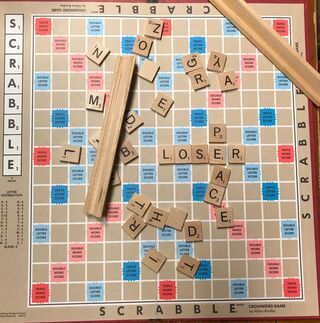Education
Learning to Lose: A Key to Inner Peace
How losing well helps you feel better about yourself.
Posted January 19, 2021
Years ago, during an early conference with my son’s first-grade teacher, I was asked, “What do you hope your child gets out of this year?” My answer was immediate. “I want him to be able to play a game without upsetting the board once he sees he is losing.” “What about math and reading?” she gently coaxed. “Yeah, he’ll get all that. But learning to lose is key.”

We all hate to lose. We like to win arguments, parts in plays, sports events and elections. We like to be right. We hate to be wrong. We are invested in our ideas, our goals, our status, and our dreams. Losing attacks who we are, what we know, and what we can do. With one blow, we are felled – suddenly seeming lesser compared to others. Everything in our system fights it, calling up defenses and behaviors to buoy our pummeled selves.
These defenses come in many flavors. We may:
Blame others - “The coach made me throw that pass – I wanted to kick!”
Suspect others – “You took two cards, not one. I saw you!”
Pull rank – “Well, I studied psychology. Did you?”
Look for loopholes – “That may be what the Times says. But I read the Post…”
Attack – The aforementioned toppling of the game board.
These maneuvers are designed to help us neutralize the blow and re-establish our sense of self. We all use some version of them every day. I did last night during a family “discussion” about proper PPE for airplanes. I was wrong and pulled rank, asking, “Exactly how many of us at this table are doctors?” (I was the only one, but I still wasn’t right). The self-esteem correction we get from these defenses is flimsy, offering us momentary advantages but ultimately eroding our core sense of worth. Seemingly paradoxical pyrrhic victories.
Here’s the key to the paradox; resorting to these defenses to right yourself says, “I am not strong enough to tolerate this momentary sense of vulnerability.” True strength allows us to acknowledge that vulnerability. It is how we learn; if we don’t see that we’ve lost, we forego the opportunity to improve.
And what about the inner peace promised by the title of this blog post? To think about that, consider a tug of war. Each side struggles mightily to overcome the other. If you’re on the side that gets pulled into the water, it’s over. There is release. You dry yourself off and get on to the next event. There can even be pleasure in the fight well fought. But not if you refuse to acknowledge the loss. Then you stay mentally and physically tense, continuing to struggle. You keep up the fight at the expense of your inner sense of peace. If you are able to release, you can make space for new experiences and future contests.
So, losing cleanly, honestly and quickly offers us a feeling of strength, the opportunity to learn, and a sense of inner peace. Here are a few things that we can do to help us all learn to lose better:
- Practice losing – Treat every new skirmish as an opportunity to lose better. Don’t wait for the big ones – try it out during the small moments of life. Could be when your boss chooses the intern's idea over yours or when the last person admitted is just ahead of you in line. The practice will help you for bigger battles to come.
- Develop losing language – Don’t reach for “yeah, but…” when you can use “You’re right!” Notice the words you immediately go for when you feel your advantage slipping. Having good, clear losing vocabulary in the ready will help you lose more easily – even before your whole self is fully ready to fully acknowledge the loss.
- Take ownership – Taking blame for the loss helps build inner strength. If you’re in leadership, try shouldering the blame to protect others when your team loses. It’s great strength training – like doing extra push-ups.
- Model losing – Lose gracefully in front of your children, your colleagues, and your partner. Show the people around you that you can survive the blow. Once again, it’s a paradox – it will show them how strong you really are. And it will model graceful losing they can practice themselves.
As long as we strive, we will sometimes lose. As long as we try out new ideas, we will sometimes be wrong. You can’t play if you can’t lose. It’s part of the game. So today, try out a new, graceful way of losing. You’ll be surprised how strong and peaceful it makes you feel.


